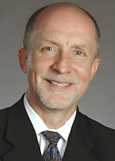Acton School a hot commodity in business education
Posted: 9/29/06
Acton School a hot commodity
in business education
By George Henson
Staff Writer
AUSTIN—The Acton School of Business may be little-known among Texas Baptists, but Hardin-Simmons University’s Austin campus has become a hot commodity in the world of business education.
The Princeton Review rated students in the school’s entrepreneurship program the most competitive in the country and its faculty as the third best in the country each of its first two years.
Forbes Magazine described the program as “an MBA for the real world.”
| Jeff Sandefer |
Co-founder and Master Teacher Jeff Sandefer appreciates the accolades, but he believes what students discover about themselves sets the program apart.
“We want students who have the intelligence and drive to change the world and the integrity to change it for the better. If we can awaken in each student a sense of their God-given gifts and help them to use these gifts to make a difference, the Acton MBA in entrepreneurship will change the world, one student at a time,” he said.
When the school was founded in 2003, its first major step was earning accreditation. When it came time to find a university partner, a legacy made Hardin-Simmons University Sandefer’s first choice. His great-grandfather was president of the Abilene school from 1909 until 1940, and Jefferson Davis Sandefer’s example made an impact on the great-grandson.
“My great-grandfather found his calling as president of a small college and is buried on the campus he worked so hard to build,” Sandefer wrote for Acton’s website. “On one side of his tombstone, it says: ‘If you would see his monument, look around.’ This reminds me each of us wants to contribute something meaningful with our lives.
“On the other side of the tombstone is inscribed, ‘A good name is rather to be had than great riches.’ This reminds me that leading a good life is even more important than what you contribute.”
His understanding that the legacy a person leaves behind—not the amount of money he or she makes—is the indicator of success has made Acton a unique business school, faculty and staff agreed.
“We ask our students to find a calling in life and not just to find a job,” Acton Director Georgia Spaeth said.
To help students find that calling, the school employs its “Life of Meaning” course and personal counseling.
“Most folks who come back for an MBA are looking for a way to make a difference,” Curriculum Director Steven Tomlinson said.
That goes along with one of the school’s core values: “We believe in building profitable businesses but know that a meaningful life is much more important.”
The MBA in entrepreneurship is unusual in that it is a one-year course of study, but it is intense.
“Our students deserve the ‘most competitive’ ranking because they consider a 90-hour work week routine. Acton is like a Navy Seal boot camp for the next generation of entrepreneurs,” Sandefer said.
Students spend 80 to 90 hours each week thoroughly investigating from all angles problems drawn from more than 300 real-world case studies, selling products door-to-door and building assembly lines.
And that is in addition to the “Life of Meaning” coursework, where students delve into themselves.
“It pulls back a curtain and helps you become clear-eyed about your aspirations,” Tomlinson said. “We try to see how many hard lessons can be learned here in the present so they don’t have to be learned in the future.
“We teach about finding calling by being thoughtful, but also by experiences. We tell our students to test hunches about what they are good at and how they can connect those talents to the challenges facing the world,” he said.
“We are really trying to help them find contentment by looking at their gifts and the needs of the world and find a connection between those two things.”
The case studies and experiential exercises expose students to a variety of real-world scenarios, he said.
“By the time they graduate, they have had a decade worth of experiences,” Tomlinson said.
Helping students find their niche in the world energizes the instructors, he added. “It’s both an art and a ministry; it’s very gratifying.” Students learn the rewards of hard work in tangible ways. They pay for the first of the two semesters, about $17,500. Students who successfully complete the program receive fellowships from entrepreneurs that reimburse them for 100 percent of their tuition.
Later, when the graduates are established in their careers, they are expected to help by contributing to the education of others. Graduates who believe Acton has delivered on its promise to help them not only run a successful business, but also have meaningful lives, are honor-bound to donate part of their future salary until another fellowship is funded.
“Our fellowships are like a money-back guarantee that forces us to deliver what we promise,” Acton Master Teacher Jack Long said.
Nancy Kucinski, assistant professor of management at Hardin-Simmons Univer-sity in Abilene, said the partnership has been mutually beneficial. Several of the HSU business faculty have attended workshops led by Acton faculty to help them hone their skills in the case-study approach to teaching.
“It’s a wonderful relationship,” she said. News of religion, faith, missions, Bible study and Christian ministry among Texas Baptist churches, in the BGCT, the Southern Baptist Convention ( SBC ) and around the world.




